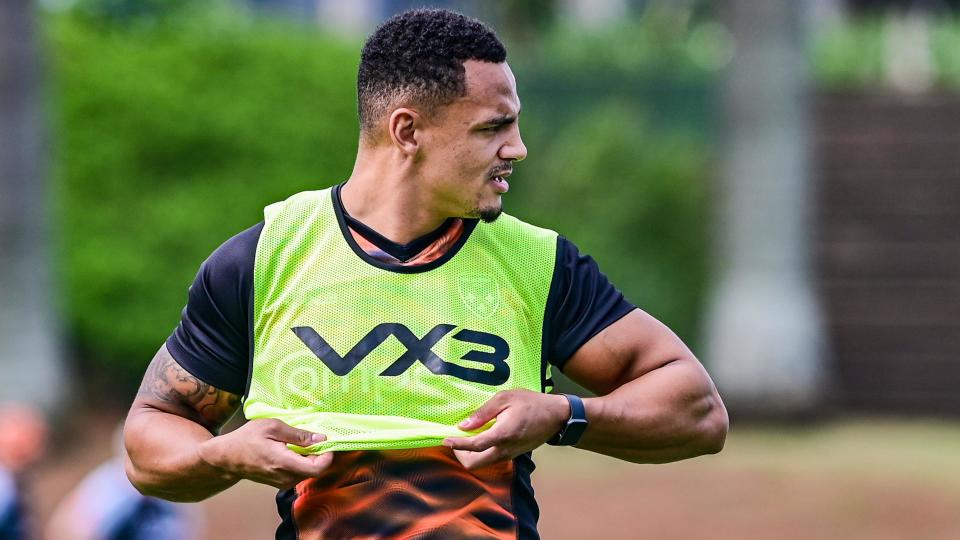I was overwhelmed by online racist abuse - Hewitt

Ashton Hewitt presumed he had experienced most kinds of racism by the time he had reached his late 20s.
A grandson of the Windrush generation, the Welsh rugby player had suffered abuse of various forms while growing up in Newport.
But his decision to use social media as a tool to encourage social change would come at a price and lead to some "dark" times.
Among the shocking material sent were images of black people being attacked, gorillas behind bars and people questioning if he was Welsh.
Now as part of Mental Health Awareness Week - which runs until 19 May - Hewitt is encouraging young people to seek support.
And he is pressing for rugby to overcome "old-school masculinity" by urging players to "open up" on the struggles they face, particularly at a time when careers in Welsh rugby appear more perilous than ever.
"I never engaged much on social media until I started to speak about things that are important to me regarding social change and equality," said Hewitt, 29.
"Some conversations were inspiring, especially talking to young people who really responded to someone talking about experiences that reflected their own.
"But I was overwhelmed by what came my way from trolls and I didn't handle that well. It really got me down.
"I thought I could engage with them in constructive conversations but what came my way was just horrible. There were people who just hate black people.
"I've experienced racism since I was a kid but the intent behind some of the stuff was shocking. It was the worst I'd ever had and just draining. It took a while before I learned how to look after myself mentally."
Online abuse is not the only challenge for sportspeople.
Hewitt, who became Dragons' second all-time highest try-scorer in December, is half way through recovering from knee surgery that cut short out his season.
The alienation of a long-term injury is just one of the challenges for professional athletes, but Hewitt believes rugby still has some way to go to embrace greater openness on mental health.
Contract insecurity
Criticism and scrutiny may be seen as "part of the job" but the economic struggles across Welsh rugby - with the four regions facing further budget cuts next season - has only heightened those pressures.
"There is pressure, criticism on social media as well as injuries, but now there is the real worry about contracts and jobs," said Hewitt.
"The contracts situation in Welsh rugby over the last year has been so hard on the players. Some of them didn't know if they had a job in a few months' time.
"The pressure is not just about winning a game on the weekend, it's about whether they can provide for their families and that brings a lot of stress.
"You would like to think things are going to improve because Welsh rugby has been in a very dark place."

Dragons have invited mental health charity Mind Cymru to speak to players while Ashton, in his role as chair of the Welsh Rugby Players Association, has pressed for mental health first aid sessions.
"There's more awareness of mental health in rugby but how much action comes of it is another question," he said.
'Toxic masculinity'
"There are people pushing that conversation but there's still an old-school mentality based on some pretty toxic masculinity where we are told to be physically robust and you're expected to be mentally tough as well.
"But even players in the game a long time realise that's not the best way to be. Just look at Owen Farrell who was pretty brave in saying he couldn't cope with that pressure and was willing to step away from something he loved.
"We need a change of culture to encourage players to open up and normalise those conversations without fear that it might impact selection or even a contract."
Mind Cymru said as many as one in five young people experience mental health issues but many are having to wait too long to receive support.
Director for Wales, Sue O’Leary, said: “As Ashton has attested, simply finding a trusted advocate and speaking out is an important first step.
"The types of problems and social issues facing young people are complex and require new supportive approaches - particularly in the digital era which has come with challenges as well as opportunities.
“Support is out there. Across Wales, there are pockets of brilliance in terms of provision for children and young people, but this must become commonplace."
If you have been affected by any of the issues in this story, BBC Action Line has links to organisations that can offer help and advice.
You can also go to bbc.co.uk/mentalwellbeing for more stories, information, inspiration and tips around mental wellbeing.

